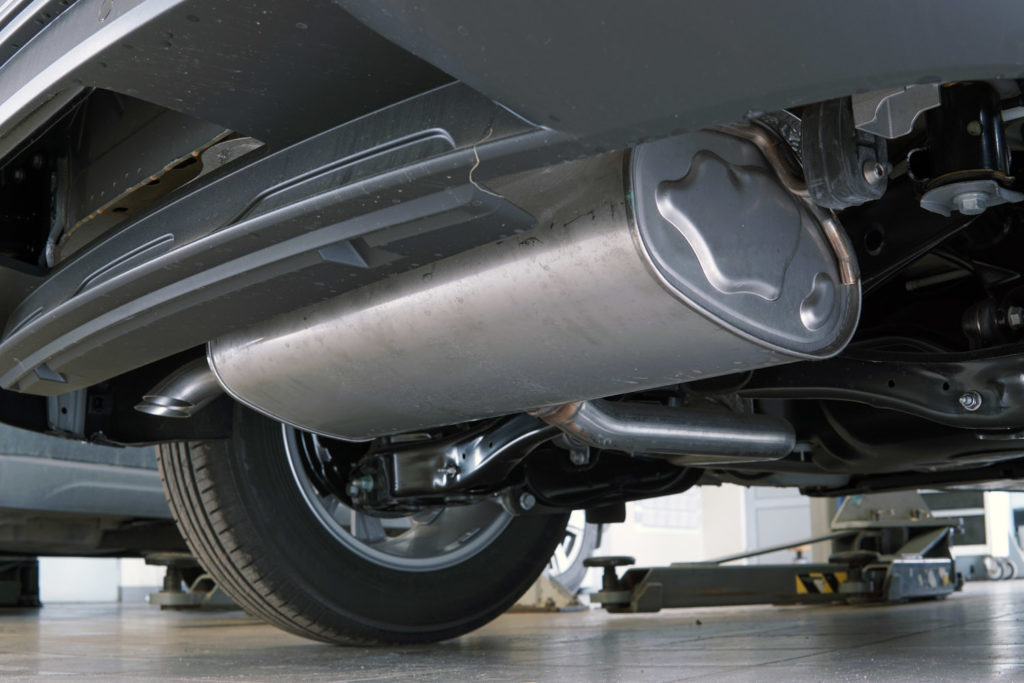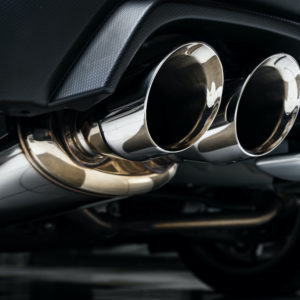Have you ever wondered what makes your car so pleasant to drive? Part of it has to do with the exhaust system, specifically the muffler and resonator. These exhaust parts both alter the exhaust note produced by the exhaust system in different ways. Let’s take a closer look at mufflers and resonators and compare the two parts.
What Is a Muffler?
A muffler is a metal device that reduces the noise emitted by a vehicle’s exhaust. This part contains multiple chambers with perforated tubes and baffles through which exhaust gasses pass. The perforated tubes reduce the volume of the gas as it expands, forcing it to exit the muffler through an indirect route. The result is a muffled exhaust note. A muffler’s design determines the exhaust volume. Stock mufflers produce a softer exhaust note because of their restrictive design. Muffler upgrades can change the exhaust note and reduce back pressure.
Some mufflers are made with materials such as fiberglass to deaden the exhaust noise. Mufflers are frequently paired with resonators because they can’t target specific frequencies within the exhaust system.

What Is a Resonator?
A muffler only reduces exhaust volume but has no effect on pitch. A resonator tunes the exhaust noise to eliminate the high-pitched sounds heard inside the vehicle while the engine is running at a high revolution per minute (RPM). Sound waves of a particular frequency bounce off the inside of a resonator to create a smoother exhaust note.
What Is the Difference Between a Muffler and a Resonator?
Mufflers reduce exhaust volume while resonators change the sound of the exhaust. They complement one another to create a pleasant sound that isn’t too loud or unbearable for drivers.

Do You Need a Muffler and a Resonator?
Most US states have federal laws requiring motor vehicles to have mufflers. For example, in Minnesota, you can get pulled over if your vehicle’s exhaust produces a sharp popping or cracking sound. Meanwhile, in Colorado, you’re prohibited from modifying the exhaust system to amplify the exhaust noise.
Despite the legal risks, some enthusiasts choose to remove their mufflers to get a louder exhaust note. This process is called a muffler delete, and it involves bolting an exhaust pipe in place of the muffler using a kit. Removing the muffler can improve exhaust flow and reduce a vehicle’s weight. But it can also increase the risk of rust in the exhaust system if it isn’t done correctly. You can also remove the resonator from the exhaust system to get a more aggressive exhaust note. A resonator delete won’t increase the exhaust volume, but it can lead to a failed annual emissions inspection. Make sure to do your homework before modifying your vehicle’s exhaust system to avoid problems.

When to Replace a Muffler and a Resonator
Mufflers are designed to last the life of the vehicle, but they can wear out faster when exposed to road salt and moisture. Faulty resonators can produce unusual sounds and exhibit other symptoms including decreased performance, engine stalling, and exhaust leaks. Keep in mind that a compromised exhaust system can lead to penalties in some states. Make sure to get your vehicle’s exhaust system inspected regularly to keep it in good condition.
Where to Get Mufflers and Resonators for Your Vehicle
Whether you have a muffler or a resonator, don’t put off replacing them once they wear out. Fortunately, a top-notch replacement that won’t break the bank is always available at CarParts.com.
We want to give drivers like you a hassle-free shopping experience. Everything’s a few clicks away, and with our vehicle selector and search filters, you’re sure to find the perfect muffler or resonator in no time.
Our muffler and resonator selections include accurate and detailed fitment information, so you’re sure to get what your daily driver needs. If you have questions, don’t hesitate to contact us via our toll-free hotline.
In addition, our strategically located warehouses ensure an efficient delivery process. You can expect your package in as fast as two business days if you place your order before 12 PM ET.
Get the best deals on replacement mufflers or resonators at CarParts.com. Shop now!
Any information provided on this Website is for informational purposes only and is not intended to replace consultation with a professional mechanic. The accuracy and timeliness of the information may change from the time of publication.



























